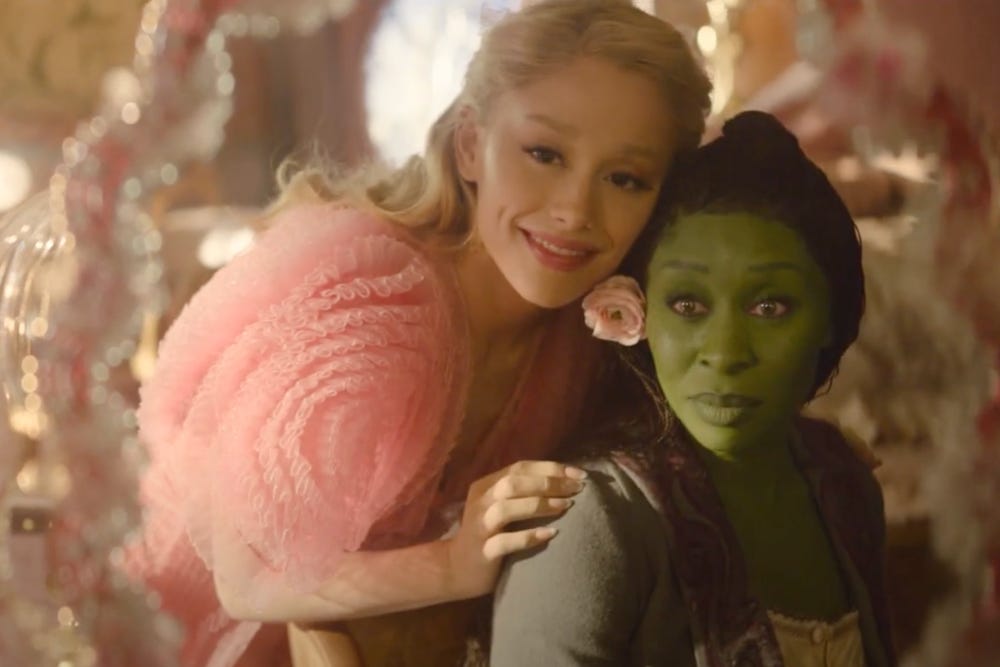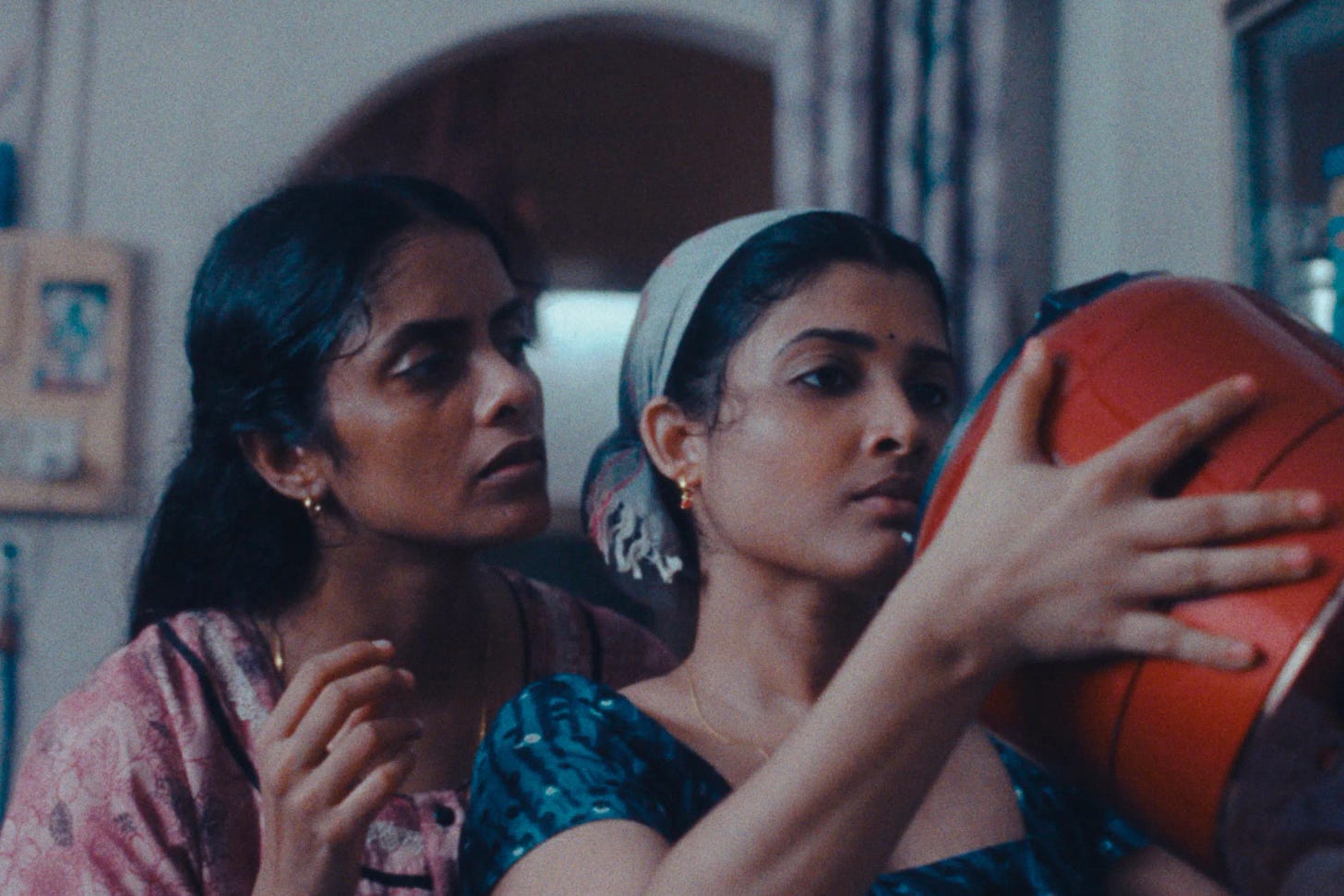In Review: 'Wicked,' 'All We Imagine As Light'
A beloved Broadway musical—well, half of it, anyway—makes a move to the big screen and an extraordinary drama from India offers a different sort of story about female friendship.
Due to the glut of fall releases, The Reveal will be running reviews on every normal publication day this week. Look for two more review days on Wednesday and Thursday.
Wicked
Dir. Jon M. Chu
160 min.
If you want to understand the difference between a 21st-century movie musical and a musical that’s been turned into a movie, try a double feature of Mamma Mia! and its superior sequel Mamma Mia! Here We Go Again. The first, directed by Phyllida Lloyd, the theater veteran and the West End stage version’s original director, competently frames the singing and dancing, often against a lovely Mediterranean backdrop. Though it mostly depends on second-tier ABBA songs and tells an even sillier story, the sequel, directed by Ol Parker, understands that the camera can move, too, and that a musical can bring in cinematic effects—that, in other words, a movie musical has to be a movie and a musical.
It’s not an easy needle to thread, particularly a few decades removed from the movie musical’s golden age, when the form has become something of a lost art. For every West Side Story, there have been many more competent (at best) adaptations that err on the side of getting the songs on screen and hoping for the best. It’s an approach that’s worked well enough to keep Rob Marshall steadily employed, but not the sort that pushes the genre forward.
The point when it becomes clear that Wicked will not be one of those unimaginative, by-the-book musicals might vary from viewer to viewer, though director Jon M. Chu has a more ambitious vision that is evident from the start. The first installment of a two-part adaptation of Stephen Schwartz and Winnie Holzman’s beloved 2003 musical of the same name (itself an adaptation of Gregory Maguire’s revisionist take on the world introduced in L. Frank Baum’s The Wonderful Wizard of Oz),Wicked takes the form of a big-budget blockbuster spectacular set in a version of Oz as sweeping in scope as the world of the Harry Potter films. But if there’s a moment when the film really comes alive, after an opening stretch made a bit poky by the set up, it’s a musical number staged in the library of Shiz University, the Ozian institute of higher learning that serves as much of the film’s setting. Stacked with singers, dancers, rotating surfaces, and expertly choreographed camera moves, it confirms that Wicked will go beyond transplanting what worked on stage to the screen.
A director whose filmography includes everything from Crazy Rich Asians to G.I. Joe: Retaliation to (most relevantly) the very good In the Heights and a pair of Step Up movies, Chu is unusually well qualified to pull off that feat, but it wouldn’t work without strong material and, above all, a cast that can pull it off. Co-writing the screenplay with Dana Fox, Holzman expands the world of the play a bit—the film’s running time exceeds the time it takes to stage both acts on stage—in telling the story of Elphaba Thropp (Cynthia Erivo), an outcast from the time she was born to the wife of Munchkinland’s governor because of her green skin. After a difficult, outcast childhood, Elphaba accompanies her paraplegic sister Nessarose (Marissa Bode) to Shiz with no intention of enrolling, only to be recruited by Madame Morrible (Michelle Yeoh), the school’s headmistress, after Morrible witnesses Elphaba demonstrate some magical powers.
It’s there Elphaba is paired with Galinda (Arianna Grande), her seeming opposite in every way. Both strive for success, but take different paths. Elphaba’s an introverted, and widely mocked, overachiever. Galinda coasts on social skills that have made her, to use the term of one of the musical’s most famous songs, popular. Yet their initial distaste for one another gives way to a genuine friendship, one that unfolds as changes have started to sweep across Oz, most notably the persecution and imprisonment of talking animals, including some of Shiz’s professors.
Wicked doesn’t fully explore the fuzzy politics of Oz — maybe the sequel will? — and instead spends time on the relationship between its two protagonists, each flawed, if well intentioned, in their way. Though the two are destined to oppose one another, this first entry works best as the story of a complex, unlikely, but real friendship, one in which Galinda helps Elphaba find a place in a hostile world and Elphaba prompts Galinda to be more thoughtful and introspective. That neither the friendship nor the changes seem destined to last adds a layer of poignancy.
It might go without saying that both Grande and Erivo have the pipes for the musical numbers, but that doesn’t make their performances any less startling. Complemented by Chu’s direction, both have standout numbers, but it’s Erivo who carries the most dramatic weight and who gets “Defying Gravity,” the showstopper that ends the film on a cliffhanger. When that moment arrives, it becomes clear that, like Dune and Spider-Man: Across the Spider-Verse, Wicked is only half a movie even with a running time that stretches past the two-and-a-half hour mark. (Its on-screen title reads Wicked — Part I.) It’s a pretty terrific first half, though, and a true movie musical all the way down to the tips of its ruby slippers. —Keith Phipps
Wicked opens everywhere on Thursday.
All We Imagine as Light
Dir. Payal Kapadia
118 min.
“Even if you live in the gutter, you are not allowed to feel anger.” That’s how the “spirit of Mumbai” is described in Payal Kapadia’s gentle, evocative drama All We Imagine as Light, and there’s some evidence of the city’s indomitable population in scenes of dancing and celebration that poke through the drudgery of everyday life. But Kapadia quietly rebuffs that notion, too, as a propaganda that suppresses the problems of a city of transients where language barriers are common, poverty is widespread, and justice seems accessible only to those with the proper paperwork in hand. That doesn’t make it an angry film by any stretch—quite the contrary, it’s fervently hopeful about the three lonely women at its center—but urban displacement is its dramatic foundation. The title is appropriately ethereal for a film that feels like a ghost story.
As the camera catches documentary-like shots of Mumbai at night in the opening sequence, Kapadia floods the soundtrack with testimonials from residents who speak in regional dialects (Marathi, Malayalam, Gujarati) about humbling jobs at the dockyard or as a nanny who are well while looking after a horrible “pest” of a child. But when she finds Kani Kusruti as Prabha, Kapadia holds the shot—it’s the one on the poster—on this extraordinary face in the crowd, someone who may feel as invisible as anyone else on a packed train, but certainly not to us or to the people who know her. As a seasoned hospital nurse, Prabha draws the admiration of her peers, as well as the persistent affections of a doctor (Azees Nedumangad) with a flair for poetry, but she keeps her distance. Her husband abandoned her for work in Germany and she seems to have abandoned some crucial piece of her life in kind.
Cautious and responsible by nature, with a stern moral streak that flares up on occasion, Prabha contrasts sharply with her younger co-worker and flat-mate Anu (Divya Prabha), who shares a conspicuously tiny place that Anu nonetheless cannot afford on her salary. As Prabha stays close to home, Anu has been carrying on an affair with a Muslim lover, Shiaz (Hridhu Haroon), in secret, sneaking out at night to shop at street markets or neck in a parking garage. In one absurd and sad moment, Anu dons a burqa to disguise herself for an illicit rendezvous in Shiaz’s neighborhood, but the trains are down due to flooding. (The spirit of Mumbai does not appear to brighten Anu’s face when she tears the burqa off in frustration.) As for Prabha, she refuses the doctor’s romantic gestures—which may or may not include a brand new rice cooker that arrives without a sender—and seems to cling to the faint hope her marriage will be restored.
All We Imagine as Light is not strictly about Mumbai, however. When a coworker (Chhaya Kadam) at the hospital loses her apartment building to a high-rise developer, Prabha and Anu accompany her back to her home village on the Arabian Sea and the film’s tone shifts as dramatically as the location. Away from the hustle-and-bustle of the city, these three women seem to find some perspective that was lost to them before and Kapadia amplifies the sensuality of the new setting. The interaction between the natural world and a force more mystical and unknowable recalls Apitchatpong Weerasethakul’s Blissfully Yours, albeit with a more grounded view of women who are wrestling with their loneliness and their freedom to make choices for themselves. Kapadia doesn’t dispel their sadness exactly, but allows for grace to slip through subtly and elegantly. They’ll take small mercies where they can get them. — Scott Tobias
All We Imagine as Light is now playing in limited release. Playdates/showtimes are here.









The problem I had when I saw WICKED on stage is that I felt, even at 29, that I was way too old for it. I know it's considered a Great Musical but to me, it's like watching a young adult novel...but not one of those Hunger Games ones that manages to be pretty deep. Just a solid enough piece of entertainment pitched at 14 year olds.
So the idea of a 320 minute version of this across two years? Nah I'm good. Unless it gets a BP nomination and then I'm dutybound to see it
Saw the stage version for the first time a few months ago. Didn’t care for it much but liked the first act a whole lot more than the second. I was going to use that to wiggle out of seeing this, but looks like it’ll only work on the sequel. Time to fake an illness.